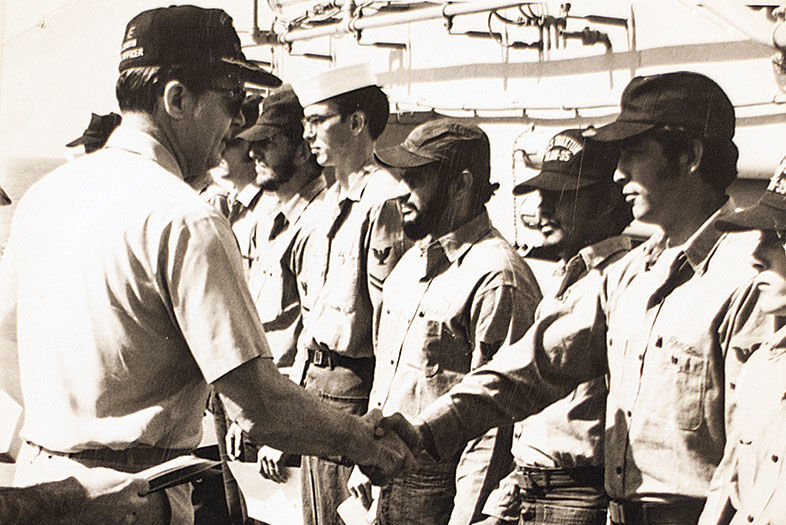It’s been 41 years since the last American helicopter filled with weary marines took off from the roof of the U.S. Embassy during the chaotic evacuation of Saigon, officially ending the war in Vietnam.
But the war has never really ended for veterans who are still dealing with the ravages of Agent Orange, the toxic herbicide sprayed by the U.S. military over large swaths of Vietnam from 1961 to 1971 to flush out enemy forces. Exposure to the defoliant is now recognized by the Department of Veterans Affairs (VA) as a cause of multiple diseases, including non-Hodgkin’s lymphoma, leukemia, Parkinson’s disease, and diabetes. Many disabled Vietnam veterans are still fighting, four decades later, to get their benefits.
When Victor Ramos arrived in Vietnam in March 1971, he was told that the Navy ship he was assigned to, the USS Truxtun, had already deployed. So he spent 24 hours in the Vietnamese city of Da Nang until a helicopter transported him to the ship.
Ramos has since been diagnosed with Parkinson’s. The now-66-year-old filed a disability claim in March 2015, providing military records that showed he served in a hostile fire area the day he landed in Da Nang.
But Patrick C. Prieb, director of the San Diego VA Regional Office, said the evidence Ramos provided did not show the Truxtun docking in Vietnam, so there was no proof he was exposed to Agent Orange.
“I spent a day in Da Nang—that’s a fact,” says Ramos. He was about to give up on his claim when he met Katrina Eagle, an attorney who specializes in helping vets appeal their denied disability claims at the VA.
Now she’s helping Ramos with his appeal. She hired an archive researcher who found the Truxtun’s logs and personnel diary, confirming the ship’s location on the dates in question.
“Mr. Ramos couldn’t have swum to the ship,” Eagle says. “The deck logs do not document any personnel coming aboard from another ship, but do document helicopters coming aboard.” And the only U.S. air base in helicopter range at the time was at Da Nang.
Eagle says the VA is denying his claim because “the document they allege is required never existed in the first place. But the military documents that do exist today confirm that Mr. Ramos is telling the truth.”
Eagle says the VA is denying his claim because “the document they allege is required never existed in the first place. But the military documents that do exist today confirm that Mr. Ramos is telling the truth.”
Prieb says the San Diego VA submitted a request to the Joint Service Records Research Center in July, to verify whether Ramos served on Vietnamese soil.
“If we are able to establish that Mr. Ramos was in Da Nang for that 24-hour period, it does qualify him to be covered for Agent Orange exposure,” Prieb says.
Ramos, an avid cyclist before he became ill in 2014, says, “It’s upsetting that San Diego VA doesn’t believe I’m telling the truth. I feel like they don’t care, and that I should not be bothering them. As veterans, we are told that the VA is there to help us. But the truth is, you’ve got to fight them for your rights.”
Chula Vista resident Anthony Angelo participated in eight combat sorties to Vietnam and was diagnosed with Type 2 diabetes just one year after returning home. Angelo, 69, filed his Agent Orange–related disability claim four years ago. The VA finally granted his benefits in March, 2016, and getting them wasn’t easy.
At his hearing, Angelo testified and presented flight manifests showing he landed in Vietnam and worked as a pneudraulic repairman on the C-123 and C-130 airplanes that carried and dropped Agent Orange.
Despite that evidence, the VA denied his claim. Eagle, his attorney, contacted Prieb, who agreed to meet with her this February to discuss Angelo’s case. As a result of the meeting the VA reversed its decision, and a month later, Angelo was granted disability.
“The local San Diego VA leaders actually apologized to me,” Angelo says. “I was shocked.”
Eagle is grateful that the VA acknowledged the errors in Angelo’s case. But she says many disabled veterans, like Ramos, are still fighting for compensation.
As for Angelo, he says all he ever wanted was for the VA to acknowledge that he wasn’t lying. “I hope my story will inspire other veterans who were exposed to Agent Orange to keep trying,” he said. “Don’t ever give up hope.”
Rated GI
The GI Film Festival San Diego is back for a second year September 14–18, featuring a variety of films for, about, and by service members, preserving the stories of America’s armed forces through cinema.
This year’s highlight is the documentary USS Indianapolis: The Legacy, produced and directed by two San Diego–area filmmakers. The thrilling retelling of the devastating torpedo attack includes first-person accounts from more than 30 survivors of the doomed World War II heavy cruiser.
Many of the events will be open to the public, with special discounted opportunities for active-duty personnel and veterans.

How Agent Orange Is Still Devastating San Diegans
PARTNER CONTENT
Ramos on the deck of USS Truxtun, 1971












